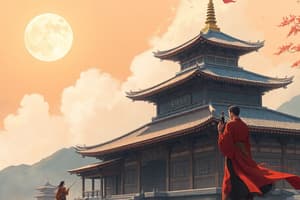Podcast
Questions and Answers
What historical event continues to fuel tensions in Japan-Korea relations?
What historical event continues to fuel tensions in Japan-Korea relations?
- Korea's division after WWII
- Japan's defeat in WWII
- China's intervention in the Korean War
- Japan's colonial rule over Korea (correct)
How did Japan's defeat in WWII affect its modern foreign policy?
How did Japan's defeat in WWII affect its modern foreign policy?
- It developed a sense of resentment and redefined national identity. (correct)
- It promoted unchallenged military expansion.
- It led to increased isolation from neighboring countries.
- It created a desire for more global alliances.
What does the US-led hub-and-spoke alliance system in Northeast Asia contribute to?
What does the US-led hub-and-spoke alliance system in Northeast Asia contribute to?
- Promoting regional rivalries.
- Fostering independence from American influence.
- Encouraging multilateral cooperation.
- Creating challenges for multilateral cooperation. (correct)
What event significantly shaped the political dynamics of Korea?
What event significantly shaped the political dynamics of Korea?
What ongoing issue complicates trust-building between Japan and Korea?
What ongoing issue complicates trust-building between Japan and Korea?
What was a consequence of the Offshore Islands crises in the 1950s?
What was a consequence of the Offshore Islands crises in the 1950s?
What did the Brezhnev Doctrine assert?
What did the Brezhnev Doctrine assert?
How did Gorbachev's New Thinking influence Soviet foreign policy?
How did Gorbachev's New Thinking influence Soviet foreign policy?
What was one significant event that was justified by the Brezhnev Doctrine?
What was one significant event that was justified by the Brezhnev Doctrine?
What effect did New Thinking have on political dissent in the Soviet sphere?
What effect did New Thinking have on political dissent in the Soviet sphere?
Who was the 2nd President of Egypt from 1956?
Who was the 2nd President of Egypt from 1956?
What major event in 1956 did Nasser play a central role in?
What major event in 1956 did Nasser play a central role in?
What major change did Japan make in its defense policy in 2014?
What major change did Japan make in its defense policy in 2014?
What was a significant consequence of Nasser's nationalization of the Suez Canal?
What was a significant consequence of Nasser's nationalization of the Suez Canal?
What concept describes Japan's right to use military force to defend allies in the 21st century?
What concept describes Japan's right to use military force to defend allies in the 21st century?
Who led the process of de-Stalinization in the Soviet Union after Stalin's death?
Who led the process of de-Stalinization in the Soviet Union after Stalin's death?
What was one of the reforms implemented during de-Stalinization?
What was one of the reforms implemented during de-Stalinization?
What was a controversial aspect of Japan's reinterpretation of its defense policy?
What was a controversial aspect of Japan's reinterpretation of its defense policy?
Flashcards
Gamal Abdel Nasser
Gamal Abdel Nasser
The second President of Egypt who played a significant role in the Arab world and the Suez Crisis of 1956.
Pan-Arabism
Pan-Arabism
A political ideology that promotes the unification of Arab countries and peoples.
Suez Crisis
Suez Crisis
A military conflict that erupted in 1956 when Egypt nationalized the Suez Canal, prompting a response from the United Kingdom, France, and Israel.
Collective Self-Defense
Collective Self-Defense
Signup and view all the flashcards
Article 9 of the Japanese Constitution
Article 9 of the Japanese Constitution
Signup and view all the flashcards
De-Stalinization
De-Stalinization
Signup and view all the flashcards
Nikita Khrushchev
Nikita Khrushchev
Signup and view all the flashcards
"Secret Speech"
"Secret Speech"
Signup and view all the flashcards
Historical Legacy in Northeast Asia
Historical Legacy in Northeast Asia
Signup and view all the flashcards
Japan's Colonial Legacy on Korea
Japan's Colonial Legacy on Korea
Signup and view all the flashcards
Japan's WWII Defeat and Subordination
Japan's WWII Defeat and Subordination
Signup and view all the flashcards
Hub-and-Spoke Alliance System
Hub-and-Spoke Alliance System
Signup and view all the flashcards
Influence on Security Calculations
Influence on Security Calculations
Signup and view all the flashcards
Quemoy and Matsu Crises
Quemoy and Matsu Crises
Signup and view all the flashcards
Brezhnev Doctrine
Brezhnev Doctrine
Signup and view all the flashcards
What did the Brezhnev Doctrine justify?
What did the Brezhnev Doctrine justify?
Signup and view all the flashcards
New Thinking in Soviet Diplomacy
New Thinking in Soviet Diplomacy
Signup and view all the flashcards
What impact did New Thinking have on the Cold War?
What impact did New Thinking have on the Cold War?
Signup and view all the flashcards




